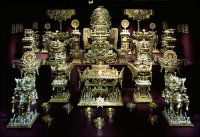Autochthonous1
Well-Known Member
I wrote ''unconducive'', then edited it a few times. Meant unconducive as in damaging/destructive/harmful. Was writing on my phone so made many errors and as I said; not able to write well atm, not slept in days. You knew what I was getting at though... as it came after the word ''hindering'', which is negative. Drew will tell you I make up words daily (some of them are actually really fantastic and I use them amongst my friends regularlyOkay, I won't quote you Autochthonous1 but there's much there to be unravelled. Could do it by email if you fancied. I don't know what you mean by 'unconducive' though - guessing you mean opposite of conducive, but it's not a word, and if you did mean it that way, conducive to what, exactly?
 ). I'm not one for picking out the grammatical errors of others, or misplaced/misused words, or un-words, myself - if I get the general gist of the statement. Had to edit that post a zillion times, gave up in the end.
). I'm not one for picking out the grammatical errors of others, or misplaced/misused words, or un-words, myself - if I get the general gist of the statement. Had to edit that post a zillion times, gave up in the end.Yeah, via email prob best, though not now as have too many other things going on I need to deal with, and let me re-read that book first, so we can talk about that.
Girls Gone Wild is the commodification of drunk college girls; a franchise with clever marketing. Nah, flashing tits or any body parts, unless it's for a job is not feminism or empowering in any, way shape or form, it's manufactured by men with hard dicks and profit maximisation on the brain who tell these young women it makes them sexy...when they grow up they realise what bullshit that is. Flashing CAN be fun (in the right place/time), if you're an exhibitionist - which isn't anything to do with feminism/empowerment. Just for thrills and kicks... y'know it's cheaper than a course in skydiving.
 I've done both. I've never flashed whilst skydiving though. Actually, my flashing days are over. Only time I will get topless in public is on the shoulders of a tall person at a rock concert...y'know, it's ok there.
I've done both. I've never flashed whilst skydiving though. Actually, my flashing days are over. Only time I will get topless in public is on the shoulders of a tall person at a rock concert...y'know, it's ok there. 
Yeah, I agree there are failings and conflict in any 'movement'. I know that. I also agree many young women are rejecting feminism without any thought, as well as attaching themselves to it without much thought - works both ways.
What is your point here though? I mean, young women will emulate older women, are you suggesting that is the fault of the sex workers? I'm pretty sure you weren't, just wondering. I think it's MTV's fault. Fuck me, music videos are pornographic now a days.No I didn't mean YOU or other sex-workers emulating sex-workers, I meant young women doing it. And that's the point - they are emulating people who are faking sexual pleasure, who are dressed like that in order to titillate. Precisely. It's your job. It's not THEIRS though.


Last edited:

 Most of the sex workers I met were either exhibitionists who did it because they actually enjoyed it (or preferred it to ''normal'' work), or mothers or students doing it for the cash. I did it for the excitement and attention (in the beginning, I was only 18) as I'd tried ''normal'' jobs and couldn't stick 'em.
Most of the sex workers I met were either exhibitionists who did it because they actually enjoyed it (or preferred it to ''normal'' work), or mothers or students doing it for the cash. I did it for the excitement and attention (in the beginning, I was only 18) as I'd tried ''normal'' jobs and couldn't stick 'em.



 So I found a short story collection I'd bought from the charity shop ages ago and read some of that. Roald Dahl - Someone Like You. Fucking ace writer - so clever
So I found a short story collection I'd bought from the charity shop ages ago and read some of that. Roald Dahl - Someone Like You. Fucking ace writer - so clever  BRILLIANT twists
BRILLIANT twists